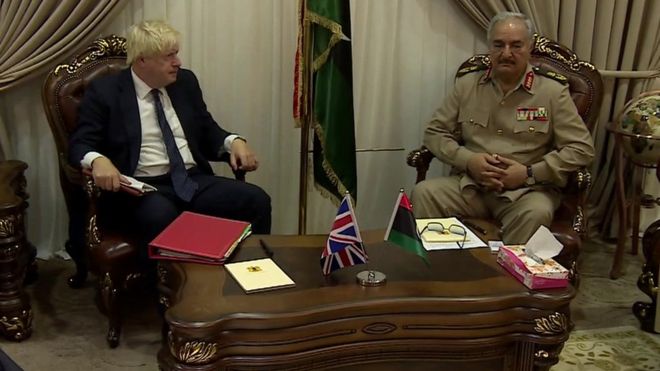European Interference in Libya Could Derail U.N. Efforts
The United Nations is preparing a new diplomatic push to reconcile feuding parties in Libya. The war-torn country will be a major topic at the upcoming U.N. General Assembly this month and Secretary General Antonio Guterres is set to convene a high-level meeting at which he will present a new action plan on Libya. The new plan, though, could be sabotaged from the start. Political maneuvering by several European states focused on narrow national interests has undermined U.N. diplomacy in Libya in recent months. Absent European unity and support, the U.N. effort will likely falter.

Published by The Lawfare Institute
in Cooperation With

The United Nations is preparing a new diplomatic push to reconcile feuding parties in Libya. The war-torn country will be a major topic at the upcoming U.N. General Assembly this month and Secretary General Antonio Guterres is set to convene a high-level meeting at which he will present a new action plan on Libya. The new plan, though, could be sabotaged from the start. Political maneuvering by several European states focused on narrow national interests has undermined U.N. diplomacy in Libya in recent months. Absent European unity and support, the U.N. effort will likely falter.
The U.N. plan comes as Ghassan Salame, the new head of the U.N. Security Mission in Libya (UNSMIL), has ramped up consultations with rival Libyan factions in an effort to jumpstart stalled U.N.-led negotiations. UNSMIL’s efforts under Bernardino Leon and later Martin Kobler produced the Libyan Political Agreement (LPA) in 2015, but the internationally-recognized agreement has still not been practically implemented on the ground in Libya. This fact has weakened U.N. influence and credibility in Libya; Salame is seeking to restore a stronger U.N. role.
While the UNGA will provide Salame with a critical platform to push for international unity on solving the Libyan crisis, the interests and actions of leading European actors could derail UNSMIL’s efforts and ultimately exacerbate the chaos on the ground. In particular, engagement by France and the United Kingdom in recent weeks has made clear that a subset of countries is pursuing narrow European interests in Libya over a unified international effort led by the United Nations. In August, British Foreign Minister Boris Johnson visited Libya, where he met with factions in both the east and west and highlighted the threat that instability in Libya poses for Europe. At first glance, Johnson’s visit appeared promising, particularly his endorsement of the LPA and his repeated emphasis on British efforts to help stabilize Libya. In reality, though, the trip further revealed the ambiguous position Britain has played in Libya.
[E]ngagement by France and the United Kingdom in recent weeks has made clear that a subset of countries is pursuing narrow European interests in Libya over a unified international effort...
The most troubling aspect of Johnson’s visit was his meeting with Field Marshal Khalifa Haftar, the rogue figure who leads the Libyan National Army in the east and refuses to recognize the U.N.-sponsored Presidential Council and Government of National Accord (PC/GNA) in the west. Haftar led a violent and drawn-out three-year campaign against what he called Islamist extremists in the city of Benghazi and has repeatedly pledged to march westward in a bid to take the entire country militarily following his “victory” there. Many in Libya, as well as the West, recognize that the LPA must be amended and that Haftar will have to play some role in the country’s future, although that role and Haftar’s true intentions remain unclear. Indeed, at a summit held by French President Emmanuel Macron in Paris in July, Haftar met with PC/GNA head Fayez al-Serraj and pledged to work towards a political agreement and future presidential and legislative elections. However, many were quick to point out that Haftar and his LNA would be unlikely to put down their arms despite the ceasefire signed in Paris. The ceasefire excluded operations against terrorists, a label Haftar has leveled against his enemies and rivals, and Haftar stridently criticized Serraj immediately following the meeting. Yet Paris continues to champion the deal; French Foreign Minister Jean Yves Le Drian was in Libya this week for follow-up meetings with Serraj and Haftar.
Johnson’s meeting with Haftar in Benghazi, then—the first visit by a senior Western politician to Benghazi to meet with the strongman—further legitimized Haftar on the heels of his successful maneuvering at of the Paris summit. “Field Marshall Haftar has a role to play in the political process,” Johnson said following the meeting, adding that he urged Haftar to adhere to the Paris ceasefire and to work with UNSMIL to amend the LPA. Haftar, who has styled himself as Libya’s bastion against extremism and terrorism reportedly told Johnson that he would give up military rule if he emerged as a victor in projected presidential elections. The implications should Haftar participate in elections and lose are not promising.
Even more problematic was the juxtaposition of the meeting with Johnson’s declaration that Libya is on the “front line” against terror threats and illegal migration facing the United Kingdom. This underlined the larger message that emerged from the visit, namely that self-interest will continue to drive Europe’s engagement in Libya. London and Paris appear willing to not only accept, but actively assist, a strongman like Haftar who claims he can deliver on the anti-terror front. Such a promise has a clear appeal given the weak position of Serraj and his PC/GNA and the flow of refugees to Europe.
French and British efforts in the last two months have served to embolden Haftar at a critical time for UNSMIL. Salame took over UNSMIL in June after months of uncertainty over who would assume the post from departing Special Representative Martin Kobler. Paris and London’s overtures to Haftar are not necessarily surprising. Special operations forces from both countries actively assisted Haftar’s troops in their fight to take Benghazi, even as French and British leaders rhetorically endorsed the LPA and the United Nations’ goal of a peaceful solution. Since then, Paris and London have elevated Haftar to the equivalent of a head of state, which leaves him little incentive to participate in good faith in a renewed U.N.-sponsored effort.
There is little unity of purpose behind Europe’s engagement in Libya. Paris is inserting itself more prominently in Libya’s crisis, perhaps reflecting an effort by Macron to boost Paris’ standing as it relates to the conflict or to undercut Rome, which has struggled to address the flood of migrants arriving from Libya’s shores. Despite Italy’s diplomatic role in Libya, French officials did not inform Rome about the Paris meeting beforehand. The messaging coming out of Johnson’s visit, meanwhile, focused on righting Britain’s wrongs following its “over-optimistic” outlook for Libya’s future in 2011, although Johnson’s emphasis on counterterrorism and meeting with Haftar demonstrated that the visit was far from altruistic.
A decision by France and Britain to place their bets on Haftar as a guarantor of stability for their interests in Libya would contradict the U.N. effort to empower a negotiated settlement under an amended LPA.
Simply bringing Haftar and Serraj together will not solve Libya’s crisis. A solution will require much more than an effort to “glue back together the east and the west” and “a bit of maturity and patience,” both platitudes offered by Johnson. There are no indications that Haftar is truly willing to compromise with the PC/GNA or lay down his arms, and a large swath of Libyans would be very likely to reject any election result that would empower Haftar—should an election even be held and the field marshal allowed to run, both of which are far from certain. A decision by France and Britain to place their bets on Haftar as a guarantor of stability for their interests in Libya would contradict the U.N. effort to empower a negotiated settlement under an amended LPA.
In remarks at the end of August, Salame called for unified international action to solve Libya’s crisis. He warned that “a proliferation of initiatives to mediate somehow risks confusing the political landscape” in Libya at a time when he is working to bring all swaths of Libyans together to enter into negotiations. This was a caution not about some possible future, but the present. Perhaps rightly trying to separate U.N. efforts in Libya from proxy actors pursuing divergent in Libya, Salame has repeatedly emphasized the responsibility of all Libyans to seize on the opportunity to reach a settlement. Yet it is impossible to ignore the troubling effect of France and Britain’s engagement on the ground. Should Europe’s leaders continue to maneuver in Libya outside of the U.N. process, the new U.N. plan of action for the country may not even matter.


.jpg?sfvrsn=407c2736_6)


